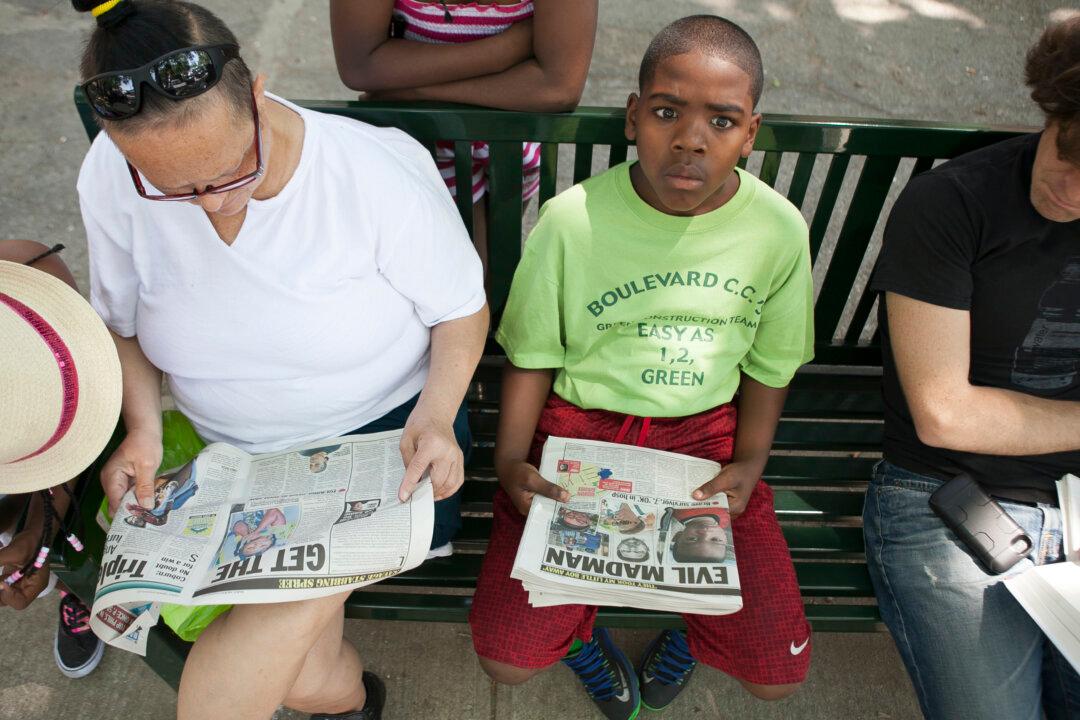Far from much of the city’s hustle and bustle, where two train lines end, sits East New York. Except for those who have a reason to go there, it is a rarely traversed corner of the city. Its streets are insulated by rows of neat, small homes with well-kept yards and one-car driveways, some housing projects, and not much else.
By and large, it’s nothing out of the ordinary. Except for last week, when rows of TV vans, throngs of reporters, and hordes of police became part of the scenery.
The location of the most commotion was at the front door of a housing project called Boulevard Houses on Schenck Avenue, just off busy Linden Boulevard. Two playmates, ages 6 and 7, were attacked there by a man with a knife. One of them died and the other remains in the hospital. The main suspect is now in custody. Many in the community feel—and the police have openly speculated—that he was also possibly involved with the stabbing death of an 18-year-old a few days earlier as she returned home from band practice in the same neighborhood. The police are also looking into a possible connection to a stabbing of a homeless man in Chelsea.
Those throngs of reporters, including several metro reporters and photographers from Epoch Times, were there for the frantic search for Prince Joshua Avitto’s killer. We were there for the man’s eventual capture. We were there for the young boy’s funeral. Every second of it was an awful nightmare.
In many ways we are far removed from what was happening. Yet even in a city this size, common ground is easily found among people when tragedy strikes. In this case, some of us live not far from the neighborhood where the attacks happened. One of us is a mother. All of us, at some point, have lost someone we love. That compassion is what guided our reporting.
During the days before the suspect was captured, some of us found it hard to describe covering the story to others. In conversations with family and friends, we simply said there was a possible serial stabber on the loose somewhere in New York City. That’s a horrible sentence to utter, and it’s even worse to know the stabber could strike again at any time.
Yet to inform the public about the hunt for such a person seemed the most useful thing we could do. Though this city is saturated with journalists, there couldn’t have been enough press about a potential serial killer on the loose. In the end, it was a tipster who gave police the suspect’s cellphone number that led to his capture.
After all the noise and chaos subsided, it was the boy who was killed, Prince Joshua Avitto, whose memory resonates. A young, sweet soul who hardly had a chance to live his life, he went by the nickname “P.J.” He was the youngest son of Aricka McClinton and Nicholas Avitto. His favorite action figure was Spider Man. His teacher recalled his humor and how he used to mischievously rearrange her desk when she wasn’t looking.
It only took spending five minutes in his neighborhood to see how adored the boy was. One neighbor described him as “the mayor of East New York.”
“Everybody knew him, everybody loved him,” said the man.
Another neighbor, a mother, said her child and “P.J.” used to play together but now she’s fearful for her young one’s safety.
“We can’t let our children go outside,” she said.
“P.J.’s” heart-wrenching funeral was last Friday, and now the community is doing what it can to move on. Man Up, a community group, organized and paid for the prom limousines for cousins of the girl who was attacked with “P.J.,” 7-year-old Mikayla Capers. She remains hospitalized.
It’s chilling to imagine the disabling fear “P.J.” and Mikayla must have felt, being trapped in an elevator with a relative giant—dangerous and disturbed. It stirs a visceral, overpowering sense of grief and regret. Our deepest sympathies are for those closest to these children, haunted by the brutality of that scene; believing, in some cases, that they could have done something to prevent it.
The mother of Mikayla’s cousins, Brigette Capers, rushed back from the hospital to see her children get into the limousine. She had tears in her eyes as the family posed for prom photos; it was not tears of happiness.
Shakira Capers, 20, a charming girl dressed in a suit, smiled strongly to the cameras, which were held by a strange mix of family, friends, and the press. Christian Capers, 18, was more reserved and solemn. The two got into separate limousines, picked up their friends, and tried their best to experience a normal teenage life for one night.
As for the immediate families of the children, they are planning to transfer to another housing project.
“It is too traumatizing for them to continue to live there,” said James Peterson, assistant executive director of Man Up. The organization is working with New York City Housing Authority on the transfer.
The senseless attacks also had one surprising impact: the community is coming together to solve some pressing issues. At a town hall meeting shortly before the alleged killer was captured, the auditorium was filled with people demanding more security cameras and fewer homeless shelters. There were no cameras where “P.J.” and Mikayla were attacked, and many residents feel the high number of area homeless shelters contributes to the number of mentally unstable people in the neighborhood.
“Nobody used to come to these town meetings,” said Joseph Arlequin, a lifelong East New York resident. “It’s sad that it takes tragedy for the community to come together, but they are.”
Reverend David Brawley said during the funeral that they won’t rest until their children have safe places to play. When he told the crowd at the funeral that surveillance cameras will be added to their buildings, people cheered.
“We’ll make it through, but we’ll never be over it,” said the reverend.
Epoch Times metro staff Genevieve Belmaker, Amelia Pang, Brendon Fallon, Samira Bouaou, and Ben Chasteen contributed to this column.




